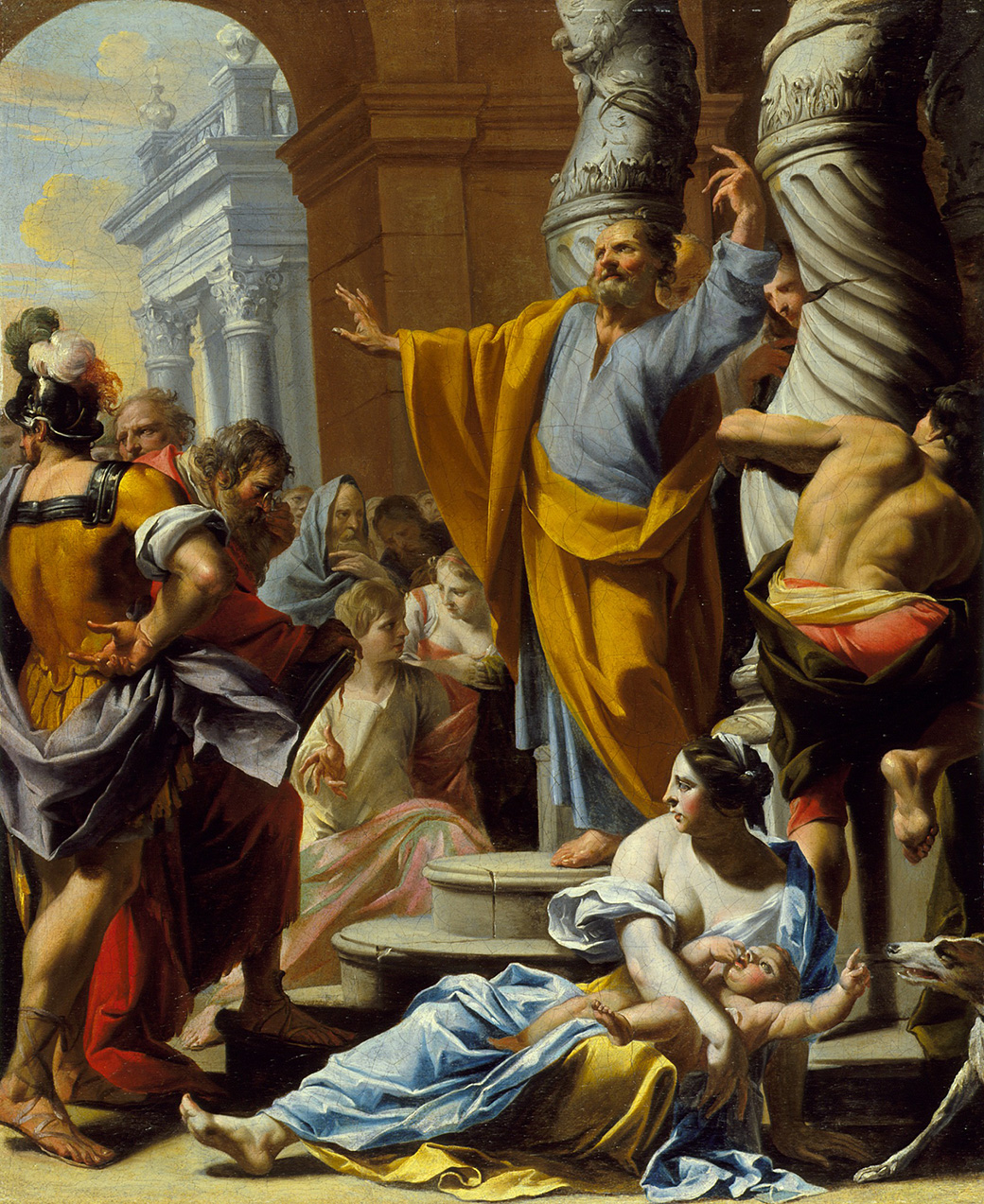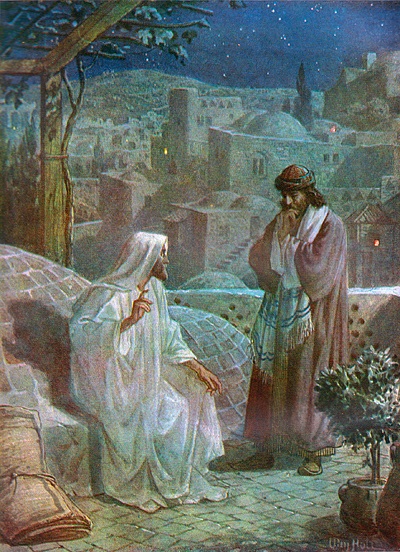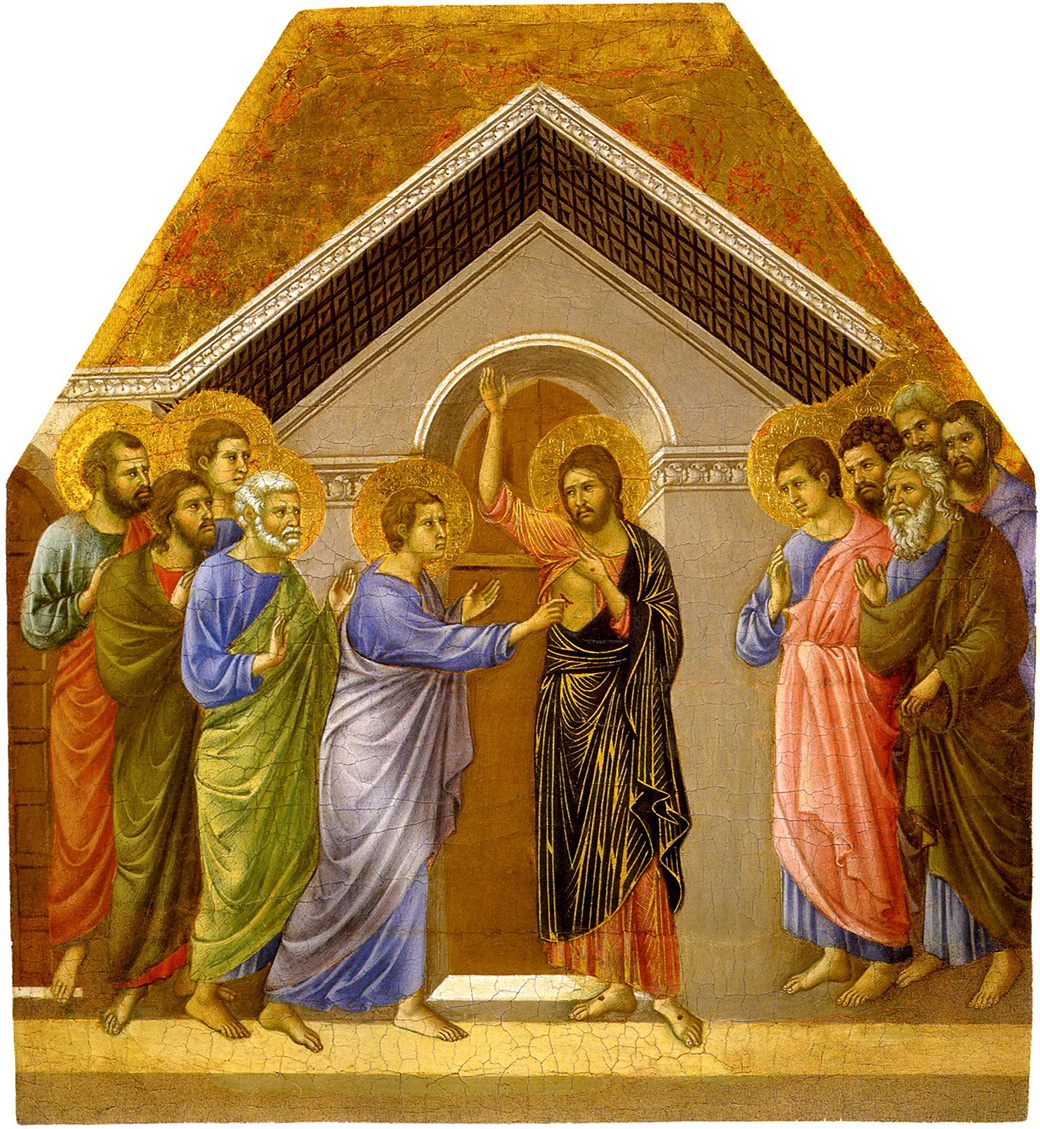Tuesday of the Second Week of Easter: Acts of the Apostles 4:32-37, John 3:7b-15.
We encounter lessons about the Holy Spirit in both of today’s readings. The first is about the beginnings of the Church in the Apostolic age, an ideal community living in truth, trusting one another, and filled with the Holy Spirit. The gospel reading from St. John is one of those amazing passages from Jesus where He reveals truths about the Spirit, salvation, and our relationship with God.
Let there be no question that the ideal Christian community is one where trust creates an environment where the idea of “personal” property and money is anachronistic, and thus communal sharing of everything is the rule. This particular passage from the Acts of the Apostles makes capitalists shudder and fall over themselves to disprove any such “socialist” core within Christianity; likewise, it makes Socialists rejoice and attempt to employ it as Biblical justification for their ideology. Both camps are wrong, of course, because they concentrate on the end result (i.e., sharing all possessions) when they should be considering the means by which the first Church got there. In fact, the Apostolic Church shows us something much more radical than any form of capitalism or socialism: it’s a community living in full communion with and focus on the Father, inhabited continually by the Holy Spirit, and proclaiming the name of the Son boldly and loudly. In short, its a community fundamentally unconcerned about its fleshly needs. They are in full mystical union with God, who provides for them. They trust one another and their Lord implicitly.

Contrast this with ideologies that try to construct markets and governments from nothing but human reason and intellect. These post-Enlightenment systems (capitalism, socialism, etc.) operate from a basis of broken trust. They all share a basic belief that people can’t be trusted without state-imposed rules, that there is nothing that unites people enough to overcome their self-interest. These are the fruits of the “Enlightenment,” which dissociated human reason from God, that pushed God out of our conception of self. If we cannot see the light of God within each other, we have nothing transcendent or universal that unites us. And if Jesus Christ is seen as one prophet among others (at best) or a fantasy for the feeble-minded (at worst), then we truly have nothing to raise humanity beyond the mire of sin and self-interest that dominates us. Well, people convince themselves that some “perfect” form of government, checks and balances, will balance our protections and freedoms perfectly. What a poor vision for humanity! Even at its best, this post-Enlightenment thinking delivers people an adult life of around 50-60 years where we retain a sense of self-possession and “freedom” within an uneasy network of other self-possessed and “free” humans who inevitably impinge upon our own bubble. That’s why we have lawyers and courts to fight and scrap over these collisions of perceived freedoms and self-possession. What a pathetic state of selfish, scrabbling people we’ve become.
So, back to the Apostolic Church. The difference here is their conception of self. They realize that their lives are dominated by the gifts God has given them: first, their own lives, but then the greatest gift of Jesus Christ, which entails everything from the baptism in water and spirit to the bearing of our sins to open the door for our salvation. What is the truth that Christ brings to the world, the reality that He uncovers? His great love liberates us from the selfishness and distrust that dominates humanity in its fallen state. This is freedom. Not something that we have to protect with laws and jealously guard (like our guns or “rights”). This one, true freedom, this love that fills us, comes from God — it is not something devised by humans, legislated by governments and protected by law. It is cultivated through faith, prayer, and proclamation, and it brings a panoply of gifts, as we see in today’s reading: “With great power the Apostles bore witness to the resurrection of the Lord Jesus, and great favor was accorded them all. There was no needy person among them.” The gifts (the “great favor”) come from God and the result is that “there was no needy person among them.” This is not socialism, where the state is the agent of power (indeed, where ideology supplants God). This is not capitalism, where the individual’s right to exploit for profit is the golden calf. This is much more radical for today’s mind to comprehend because it forces us to question those assumptions about the inviolability of human reason that we inherit from the Enlightenment and modernity. Our passage today reveals that the perfection of the Apostolic Church lies exactly in the radical reliance on something unreasonable, something at first glance not apparent or logical, something mystical. The Church is perfect only because they rely upon and trust (i.e., have faith) not only in God’s desire to bring us to Him but the manifested action of his doing so through Jesus Christ. As a consequence of this, and only this, they are bathed in the Holy Spirit, they shed their destructive self-interest, they trust one another, and thus “no one claimed that any of his possessions was his own, but they had everything in common.” Why would they need to own possessions separately from this community of the Spirit? It becomes not just silly, but something against the will of God, the impulse of charity, and the movement of love in the world.

In the gospel reading, Jesus attempts to teach the Pharisee Nicodemus about being baptized in this something unreasonable, this something mystical. Nicodemus comes to Jesus under cover of night, likely in part because the Pharisees were deeply distrustful of Jesus rocking the boat of earthly power they had established, so he couldn’t come to Jesus openly in the daytime out of fear of being chastised by his fellow Pharisees. Yet in the act of coming to Jesus at night, which is a breaking of ranks with the Pharisees, Nicodemus shows that he wants to come out of the “night” of unknowing into the light of truth that Christ is giving the world. In Judea, men would relax on rooftops at night, where the desert winds would provide cool after the heat of the day. So, here Jesus reclines with Nicodemus and in the verses before today’s passage tells him, “no one can enter the kingdom of God without being born of water and Spirit.” Nicodemus is stuck in the reason and knowledge of earthly things that we see come to prominence in the Enlightenment; he doesn’t understand how people can be born again once they are born by their mother.
Today’s reading is Jesus’s answer: ” You must be born from above. The wind blows where it wills, and you can hear the sound it makes, but you do not know where it comes from or where it goes; so it is with everyone who is born of the Spirit.” At first glance, this seems to be a non-answer, but Jesus, the great teacher that He is, uses the beautiful earthly phenomenon around them to draw an analogy. The wind, although we cannot see it or understand the directions it travels at any given moment, nonetheless exists and has great power and movement in the world. And so like this earthly phenomenon, there is the heavenly phenomenon of the Spirit that can move within those who are “born from above.” His lesson is one that is just as important today: don’t look to reason your way into knowing the ways of God and the Spirit. Don’t think that this is something that comes from your intelligence or even your effort of prayer or ritual. We must accept that, like the wind, the Spirit is active and powerful despite our inability to see it or understand it.

When Nicodemus says, “how can this happen?” he reveals that he is still stuck in his own head, in his own need to challenge and dissect the workings of God. Jesus’s answer is fantastic, “You are the teacher of Israel and you do not understand this?” not because He is somehow shaming Nicodemus but because He points to the entire tradition of the Jews as His proof. He is saying, here you have the entire history of God’s miraculous intervention into the lives of your people, from Abraham, Noah, Moses, the prophets and up to today, and you’re asking “how?” with disbelief??
Jesus’s following statements are a good reminder to us that even if we have the gist of the wind analogy, we must remember that it’s just an analogy and the heavenly truth is incomparably deep in mystery. He says, “If I tell you about earthly things and you do not believe, how will you believe if I tell you about heavenly things?” In other words, the comparison between the action of the wind in the world and the Spirit in the people “born from above” is still just an analogic glimpse into what the Spirit might be. If we can’t grasp and believe that, how could we possibly handle a statement about the actual truth of the Spirit or the nature of God?
Jesus’s final statement in today’s reading does give us a glimpse of the mystery He brings to the earth, again in a type of comparison to something Nicodemus already knows. It undoubtedly mystified Nicodemus (who was already mystified by the wind analogy) because Christ had not yet entered into his Crucifixion and Resurrection: “just as Moses lifted up the serpent in the desert, so must the Son of Man be lifted up, so that everyone who believes in him may have eternal life.” We explored this passage in a prior reflection (see Bridging Salvation History with a Serpent), but suffice it to say that Jesus is pointing to this same paradigm of glimpsing reality-by-analogy. There is the analogy of Moses’s serpent staff and the Son of Man hung on the Cross, and there is a glimpse of heavenly meaning at the heart of both “liftings up.” They both provide salvation (Moses’s staff provides a remedy from deadly snake bites for earthly saving while Jesus provides eternal salvation) through the symbol of sin being sacrificed, which is but a glimpse of the eternal flux of love that God is. Christ is more than His Crucifixion, although it is fundamental to His saving mission. Christ is also the Way that brings the Living Spirit into the lives of his disciples. God is living, active love flowing constantly in the universe, a reality that we merely glimpse with our faculties, reason, and intellect. It takes our faith to truly live with the mystical reality of God in the world, and “blessed are those who have not seen and have believed” as Christ tells Thomas, presenting Hs hands and side to be felt.

I love contemplating the “community in Spirit” that the Apostolic Church managed to live. Even if it didn’t last in perfection that long, it is at the heart of the Church as the Body of Christ, the Bride of Christ. It displays for us the perfection of living in the Spirit, boldly proclaiming the Word of God, and trusting one another. We should all hold this in our hearts as the true life for which we strive.
Some might say that this perfect community is impossible, that, practically speaking, humans just can’t be truly communal. I respond that this is indeed impossible without God at the center of each person’s existence. This is the basis of monastic life! Countless lay Christians have also committed themselves to intentional communities over the millennia. It is understandably hard, as any truly selfless act is, but it is definitely not impossible if the Apostolic spirit (and the Holy Spirit) is evident.